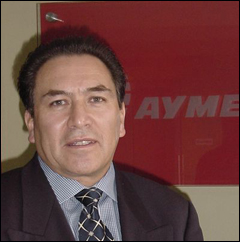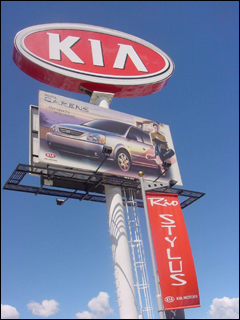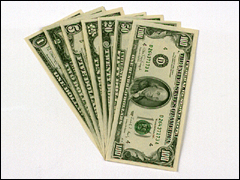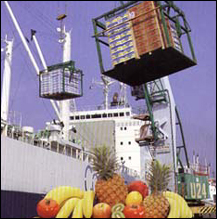|
 View this document
in Spanish.
View this document
in Spanish.
 FROM ECUADOR…
TO THE WORLD FROM ECUADOR…
TO THE WORLD |
Thanks to dollarization, the Ecuadorian economy
has enjoyed financial stability during the last
few years. However, the adoption to the dollar
has also decreased the comparative advantage of
Ecuadorian enterprises in the region, since the
dollar has increased salaries and costs of production.
"Globalization should oblige Ecuador to
be more attractive, as much for national investors
as for foreign companies, starting with the fact
that we have a dollarized economy which makes
us less competitive than our neighbors" underlines
Gustavo Romero of Romero Arteta
Ponce Attorney at Law.
To be more competitive is exactly what the most
dynamic companies in the country have had to do
in order to survive. By renovating technologically,
improving their management skills and planning
on short and medium-term bases, certain Ecuadorian
companies managed to decrease their fixed costs
and use the strong dollar to expand into the regional
market.
For Cesar Galarza Garces, General Manager of
AYMASA
/ AEKIA S.A., the main error of many Ecuadorian
businessmen was to keep thinking as they did when
the country used the "Sucre", the currency
which was used before dollarization.

"Now we must face the presence of the dollar
as entrepreneurial leaders and innovating managers
in order to go ahead", recommends Galarza
Garces. His company made a successful turnaround
after loosing a major contract with General Motors,
and through aggressive business deals it signed
on to assemble the Korean line of KIA cars and
the Russian line of NIVAs. Up to now its production
is of 3,200 vehicles per year, with a high capacity
for growth.
"There are lots of opportunities for the
growth of Ecuadorian enterprises, especially with
the upcoming adoption of Andean or Pan-American
free trade agreements. Our installations are recently
renovated and ready for increased production",
he revealed.
Before the FTAA (the Free Trade Agreement of
the Americas, which is planned for adoption by
2005) takes effect, AYMESA
is preparing to expand and invest strategically
to develop regional vehicle assembly plants in
the Andes. "We are also going to manage the
operations of KIA in Colombia and we are proposing
to manage KIA of Venezuela", Galarza Garces
points out.

For Jorge Donoso Moran,
General Manager of FLOPEC
(Ecuadorian Oil Fleet), the secret to staying
afloat in a context of dollarization was "to
seek efficiency, to lower costs and to adopt a
series of controls in the areas of maintenance,
repairing and training".
Another strategy was also to diversify production
and exports. For example, Ecuador's rose industry
suffered a major setback with the adoption of
the dollar. Its product is unequalled everywhere
in the world: the altitude of the valley of Quito
and the strong light of the Ecuadorian sun produces
roses with long stems, very big buttons and intense
colors. Yet in the context of dollarization, many
costs such as transportation and labor increased
drastically, leading to the collapse of numerous
major rose producers. Companies like Diamond Roses
had to reduce their costs and diversify its exports
to survive.

"The strategy was to keep external control
of costs without stopping expansion plans, while
investing in the elements that were necessary
to grow" said John
Teran, President of Diamond
Roses. The company successfully adapted to
the dollarized market by exporting to new markets
such as Russia and developing new partners for
the international sales of its roses.
In spite of complaints by companies that the
dollarized model did not allow them to compete,
these companies have in fact demonstrated that
with administrative efficiency, modern installations
and constant capital they can survive in the market
and expand their business to other countries,
not only in the American continent but in all
four corners of the world.
|
 LEARNING
FROM THE CRISIS LEARNING
FROM THE CRISIS |
In a manner of speaking, business people in Ecuador
had to go to school all over again. They had to
learn the lessons from Ecuador's economic crisis
of the 1990s, when credit lines ran out and half
the financial sector went in hiding, and develop
new business plans in order to thrive in the new
economic environment.

"It was a tough lesson to be learned"
remembers Roberto Gonzalez, Spanish banker and
Executive Vice-President of the Banco del Pacifico,
which represents one of the major banks of the
country. He believes that the main lesson which
the banking sector had to learn was "to maintain
high levels of liquidity, which is necessary to
overcome unexpected financial pressures".
Out of the 44 banks which operated in Ecuador
befote 1999, now only 22 of them have survived.
Following this forced consolidation process, today
they benefit from "interesting profit margins"
which are inexistent in other economies and does
not pose the risk of many emerging economies,
thanks to a dollarized economy and upcoming financial
reforms.
Today, the high cost of financing new projects,
with interest rates that circle the 20 per cent
mark, has slowed local industry since there is
little access to capital or credit to finance
any new investment projects.
Although the government still has lots of homework
to do in order to increase access to credit, the
Spanish banker maintains that "Ecuador is
a country that is worth the risk", since
it can offer opportunities in sectors like tourism,
petroleum, telecommunications and electricity.
"It's a diamond in the rough" he says
from the meeting room of his head office, located
in the centre of the City
of Guayaquil, which is becoming the motor
of the Ecuadorian economy.
The economic analyst Walter Spurrier believes
that the government has two pending issues to
resolve: "open up the petroleum sector to
attract new investments and increase competition,
while applying a policy of cost-reduction to take
advantage of the dollarized economy"
Up to now, Spurrier agrees that the government
has made notable efforts to balance its finances
and reach a fiscal surplus, "but this is
only the beginning" he warns. "Major
economic reforms are still lacking".

Alberto Dassum, President of the Chamber of Industry
of Guayas, agrees that the efforts of the government
to stay on track with the IMF agreement is "a
positive signal to investors".
Spurrier predicts that the industrial sector
will shoulder the crisis if the government permits
flexible labour practices and a decreases the
cost of public services. In fact, he bets that
the bankruptcy of bigger, inefficient and unproductive
companies will open up the field for smaller,
leaner and more modern companies to take the lead
in this new marketplace.
Shrimp exporter Xavier Andrade, from the Exporklore
company, cites his sector as one of the most affected,
since the economic problems of the country coincided
with the "white spot virus", which ravaged
their catch and killed large quantities of Ecuadorian
shrimp.
Andrade maintains that there were no secrets
to survive: "decrease costs, improve genetics
and apply new cultivation technologies."
Like Diamond Roses, Andrade had to reassess his
strengths and find new clients and new markets.
In fact, the white spot virus obliged shrimp
producers to adopt new technologies early on in
order to improve production. "In terms of
technology we have an advantage and a lead of
2 to 3 years over the competition" asserts
Andrade.
Today the sector anticipates increased participation
by investors who are ready to develop these techniques
and ensure that Ecuador remains as one of the
main producers of shrimp in the world.
Dassum believes that the best way to attract
investors to Ecuador is through the promotion
of high-growth sectors like the fishing, electricity
and manufacturing industries. According to him,
the country should put aside the idea that dollarization
is a straight jacket which makes life intolerable
for exporters and producers. On the contrary,
he says, the risk of asset devaluation disappears
thanks to the dollar. "Ecuador can provide
security in terms of investment; the dollar you
invest today is the dollar that you can rely on.
Perhaps you will have a higher cost of labour,
but our fiscal stability is second to none"
he maintains.
Joaquín Zevallos, the President of the
Guayaquil Chamber of Commerce, represents the
voice of 4000 affiliates. He actually agrees that
the crisis was a blessing in disguise since the
dollar offers foreign investors a security that
they never had, and they can come to Ecuador "without
suffering from high inflation or the cost of reinvestment".
This is an important chapter in the history of
Ecuador. After the storm of the 1990s, the country
has settled down and the industrial sector has
taken a decisive step to modernise, open its markets
and search for foreign investors. Now comes the
time to move ahead which, according to Zevallos,
is "the most important issue facing us today".
|

